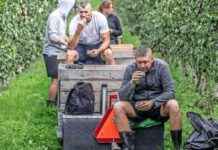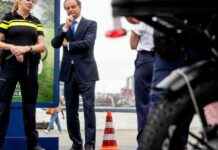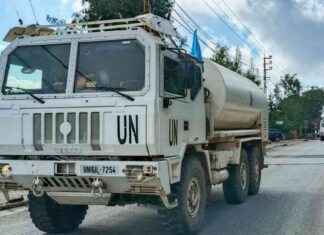They knocked over members of high school bands, and then gathered around an assistant coach, praying, as he sat down in prayer, surrounded with uniformed players.
Six years later, , after losing his job as a coach, and losing repeatedly in court, Joe Kennedy, a former Washington state coach, will present his arguments to the U.S. Supreme Court. Joe Kennedy claims that the Bremerton school district violated his First Amendment rights by refusing him the right to continue praying at the midfield after each game. Four conservative justices already raised concerns about how Kennedy’s case was handled.
Kennedy’s efforts to get his job back earned him a spot at a 2016 Donald Trump rally. He quickly became a cultural touchstone by contrasting public school employees’ religious freedoms against what his critics call longstanding principles that separate church and state, and protect students from religious coercion.
Lawyers representing the school district claim that Kennedy was allowed to pray in a separate area from students and to return to the field after students have left. However, allowing Kennedy to pray at the midfield after games could be seen as government endorsement of religious beliefs.
Kennedy claims he didn’t care if students participated in the prayers, and he never asked them for their support. However, at least one anonymous player later claimed that he had taken part contrary to his beliefs out of fear of losing playing time.
“This case challenges well-established case law which has protected students’ religion freedom for decades and that has been supported both by conservative and liberal justices alike,” Rachel Laser, chief executive of Americans United for Separation of Church and State (representing the school district), said. Teachers and coaches could force students to pray in any public school across the country if the court rules against them.
Kennedy’s supporters consider the 9th U.S. Circuit Court of Appeals’ ruling in the case would require public school employees to give up their religious identity at the schoolhouse doors — something that they claim the Constitution doesn’t require.
According to Jeremy Dys, an attorney at First Liberty Institute who is representing Kennedy, “If a teacher prays in the cafeteria over her lunch and students can see it — just that little blessing over the salad — that’s enough for that teacher to be terminated,” Dys said.
Kennedy, a former Marine who worked at the Puget Sound Navy Shipyard, started coaching football at Bremerton in 2008. Kennedy, a former Marine who worked at the Puget Sound Naval Shipyard, began coaching football at Bremerton High in 2008.
It began as a solo practice, but soon attracted students. He agreed to it, citing the district’s policy of not encouraging or discouraging student prayers. He began leading locker-room prayers before games and led group prayers after them.
Kennedy led players in prayer, but the school district didn’t know about it until September 2015 when it was told by another coach. He was told by administrators that he would not be allowed to share in religious activities with students and that any religious observation he makes should be non-demonstrative.
Kennedy was compliant for a month, according to arguments made by the district in arguments to court: Kennedy prayed on his own while students were singing the fight songs, and the district allowed him to be.
Kennedy’s lawyers insisted that he resume his previous practice. They described it as a “personal” prayer, protected by the Constitution regardless of whether students were there. Kennedy declared that he would return to praying at midfield after games. When he did, at the Oct. 16, 2015 homecoming game, Bremerton’s players were already busy, the spectators ran to the field to join Kennedy — and members of the opposing side.
Kennedy was not fired by the district, but they wrote to warn him. Superintendent Aaron Leavell stated that Kennedy’s previous statements and actions could have been interpreted as an endorsement of religion by the school. He was praying at midfield on property owned by the government, which he could only access through his job.
Leavell stated, “I want to emphasize again that the District does not prohibit prayer or any other religious exercise by employees.” “However it must ban any conduct by its staff that would serve as District endorsement for religion.”
Kennedy again prayed on the field following the two next games. He was first joined at a varsity match by no one, then at a junior game at which he was joined at the knees by a state legislator. He was then put on leave by the district and his contract was terminated.
Kennedy’s lawyers argue that Kennedy stopped participating in religious activity with Bremerton student when he was asked. They argue that he was suspended for not delivering prayers to students but for kneeling down and praying quickly alone.
District Judge Ronald Leighton was the federal judge that ruled against Kennedy. He compared Kennedy’s postgame behavior with a director who prays at the end a school play.
Kennedy lost every stage of the case as it progressed through the courts. The Supreme Court decided not to hear the case at an earlier stage. Justices Samuel Alito and Clarence Thomas, Neil Gorsuch, and Brett Kavanaugh labeled the reasoning of the 9th Circuit “troubling” saying that “public school teachers or coaches could be fired if they express any opinion the school doesn’t like while on duty.”
Ninth Circuit Judge Milan Smith suggested that a teacher who prays in a cafeteria does not send a public message like Kennedy. Smith called Kennedy’s lawyers’ narrative, that it was about a private prayer of a public employee, “deceitful.”
Kennedy stated that he wants to return to coaching.
He said, “This whole thing has been so out of control.” Imagine a man going out and tying his shoes — you wouldn’t know the difference.








